- Research
- Research Centers
- Journals
- Admission
- Introduction
- Programs
- Application
- Alumni & Giving
- Alumni Club
- Giving
The China International Communication Discipline Construction Seminar & Preparatory Meeting for the International Communication Committee of the China Education Association for International Exchange (CEAIE) was held at Beijing Foreign Studies University (BFSU) on Oct 29.
Focusing on major issues such as the construction of China's international communication capacity, the development and talent cultivation of the international communication discipline, and the establishment of the CEAIE International Communication Committee, the meeting marked an important step in building a world-class international communication discipline system with Chinese characteristics.
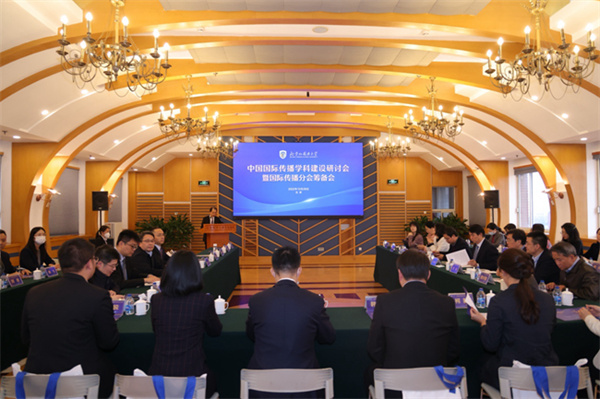
The China International Communication Discipline Construction Seminar & Preparatory Meeting for the CEAIE International Communication Committee is held at BFSU on Oct 29. [Photo/bfsu.edu.cn]
Those in attendance at the event included officials and representatives from renowned government departments, media outlets, research agencies and higher education institutions in the field of international communication.
Yang Dan, deputy secretary of the CPC BFSU committee and president of the university, delivered a welcome speech.
The meeting was presided over by Sun Youzhong, member of the standing committee of the CPC BFSU committee and vice-president of the university.
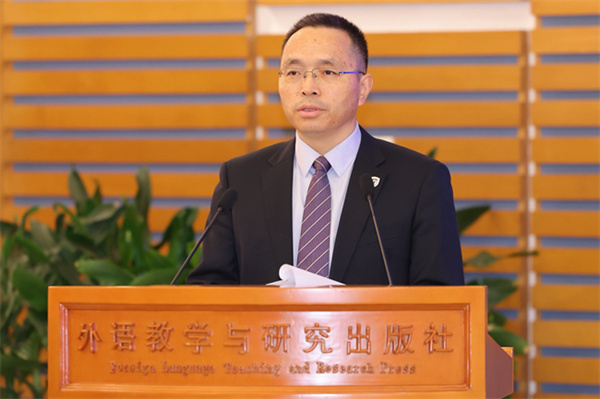
Yang Dan, deputy secretary of the CPC BFSU committee and president of the university, delivers a welcome speech. [Photo/bfsu.edu.cn]
Yang expressed heartfelt thanks to the participants and delivered a welcome speech entitled "Join hands and make efforts: Building an international communication discipline system with Chinese characteristics, styles and manners", in which he said that the construction of China's international communication discipline should better serve the great cause of the Chinese path to modernization.
Yang suggested that the discipline construction should be based on China’s national conditions and the requirements of the times, while building international communication with Chinese characteristics, forming an independent knowledge system in China, holding a global perspective, promoting cultural exchanges and mutual learning of human civilizations, and establishing a community with a shared future for mankind.
He said the construction of China's international communication discipline is faced with multiple challenges, including lack of disciplinary independence, deficiency in the integration of ideas and knowledge, and a gap in coordination among international communication academia, industry and government departments.
As the initiator of the International Communication Committee, BFSU will give further play to its foreign language advantages, tap disciplinary resources in global languages, culture and governance and tell China’s stories well and convey the voice of China. The university will utilize its global languages, culture and platforms to empower international communication, make innovations with cutting-edge technologies and enhance participation with its multilingual academic journals and index matrix, Yang said.
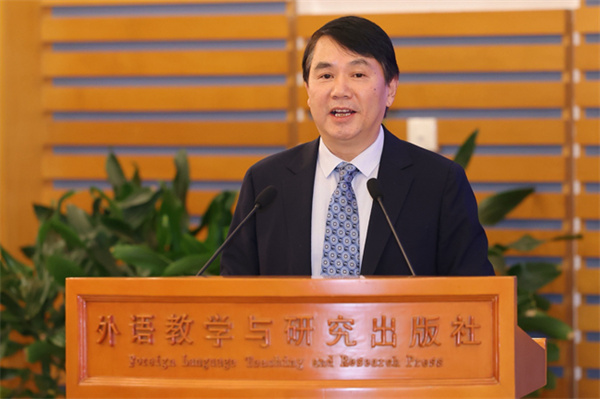
Wang Yongli, vice-president and secretary-general of CEAIE, affirms the role BFSU plays in international communication discipline construction. [Photo/bfsu.edu.cn]
Wang Yongli, vice-president and secretary-general of CEAIE, affirmed the responsibility BFSU shouldered in taking the lead in international communication discipline, talent and think tank building by pooling political, academic and industry resources. As a member of CEAIE, the university has led the development of foreign language education in China for years, and has undertaken the historical tasks of establishing communicating between China and the world, he said.
Wang placed great hope on the establishment of the International Communication Committee initiated by BFSU, adding that CEAIE would support the committee and continue to promote exchanges, mutual learning and common development of high-quality educational resources at home and abroad.
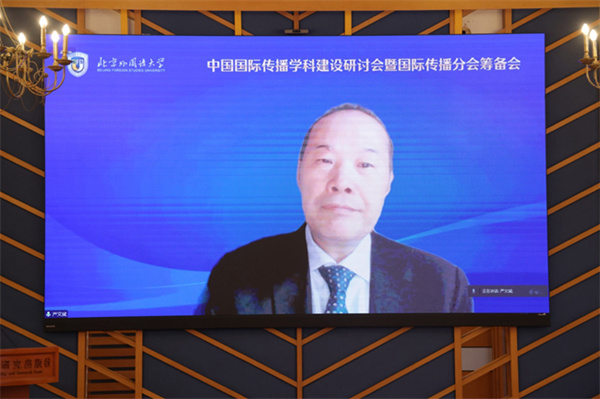
Yan Wenbin, a senior editor and former vice-president of Xinhua News Agency, gives a speech at the meeting. [Photo/bfsu.edu.cn]
It is of great significance that BFSU is leading the establishment of the committee, said Yan Wenbin, a senior editor and former vice-president of Xinhua News Agency. Language proficiency, cultural understanding and communication skills are the foundations for cultivating high-end international communication talents, he said, stressing the importance of changing overseas audiences’ perception and behaviors toward China and the fine traditional Chinese culture.
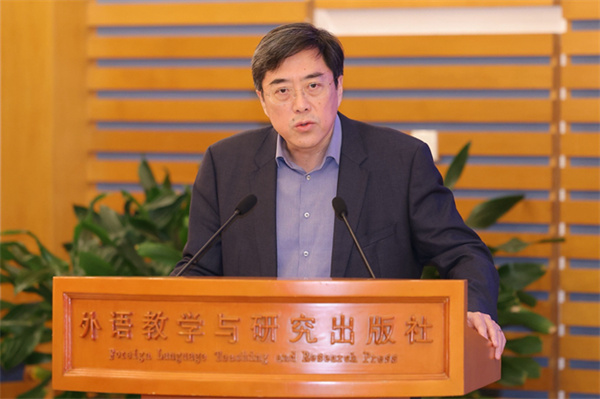
Fan Yun, member of the CMG editorial board and director of CGTN, speaks at the meeting. [Photo/bfsu.edu.cn]
Fan Yun, member of the editorial board of the China Media Group (CMG) and director of CGTN, said language skills, talent reserve and the collaboration of practitioners are vital to heightening China's international communication.
Through the close partnership with BFSU, the CMG is exploring new methods, hoping to upgrade the full coverage of targeted audiences and obtain greater communication influence, Fan said.
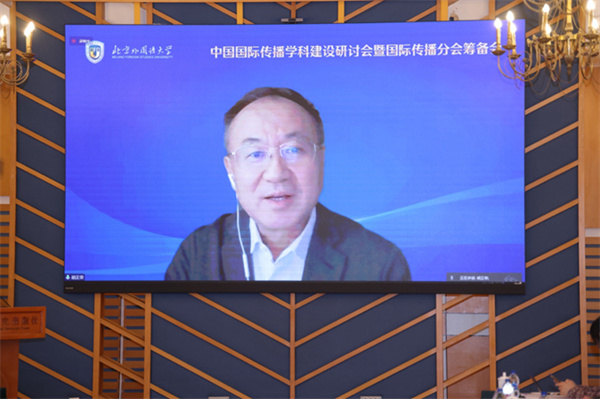
Hu Zhengrong, director of the CASS Institute of Journalism and Communication, shares his views on the construction of an independent international communication knowledge system. [Photo/bfsu.edu.cn]
Hu Zhengrong, director of the Institute of Journalism and Communication at the Chinese Academy of Social Sciences (CASS), said the construction of an independent international communication knowledge system with Chinese characteristics should take application, the discipline and relevant majors into consideration, and provide convertible solutions for society.
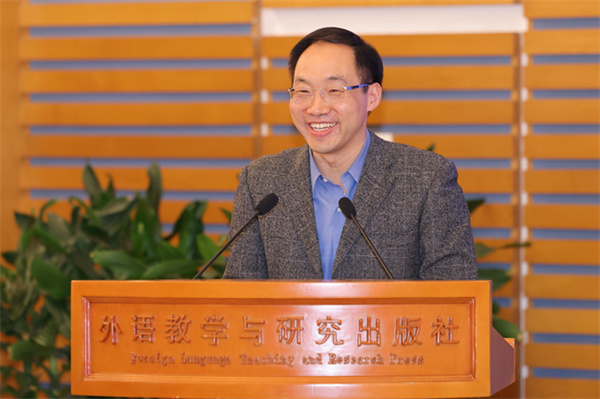
Yu Yunquan, director of the Academy of Contemporary China and Word Studies at the China International Communications Group, delivers a speech at the meeting. [Photo/bfsu.edu.cn]
Yu Yunquan, director of the Academy of Contemporary China and Word Studies at the China International Communications Group, said the connotation of international communication should upgrade from the specific international news reporting business to a new dimension based on the perspectives of civilization, exchanges and mutual learning in the context of promoting the Chinese path to modernization and creating a new form of human civilization.
International communication construction is a long-term and historical task. The key is to pool the strength and resources of all parties and come down to earth, said Yu.
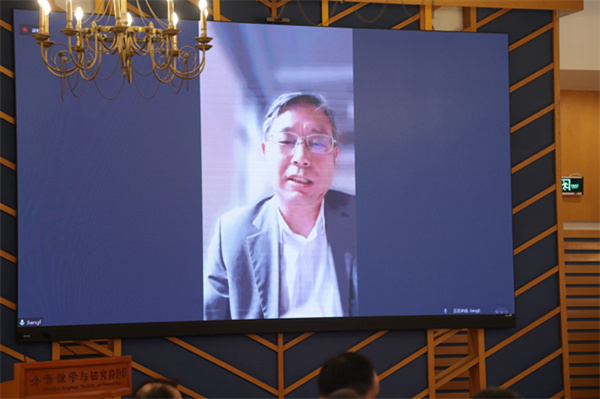
Jiang Feng, secretary of the CPC SISU committee, gives suggestions to foreign language universities at the meeting. [Photo/bfsu.edu.cn]
Jiang Feng, secretary of the Party committee of Shanghai International Studies University (SISU), said foreign language universities should take responsibilities and bear in mind the differences between Chinese and foreign cultures to better serve the communication and development of the national strategy.
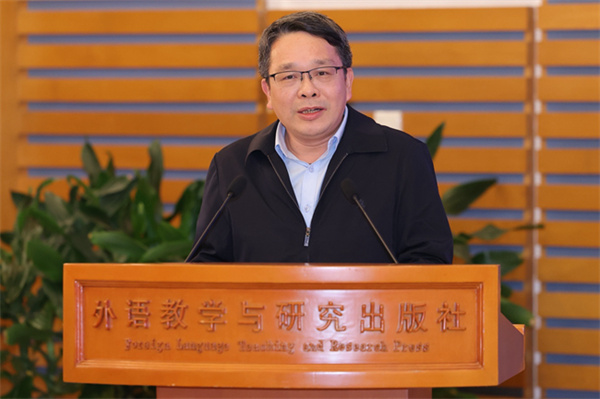
CUC President Zhang Shuting acclaims BFSU’s unique advantages in training international communication talents at the meeting. [Photo/bfsu.edu.cn]
Zhang Shuting, president of the Communication University of China (CUC), acclaimed the unique advantages of BFSU in training international communication talents. He said the strategic cooperation agreement signed by the CUC and BFSU last year drew on the strengths of both sides and the university will continue to expand practical cooperation and usher in a new chapter of international communication.
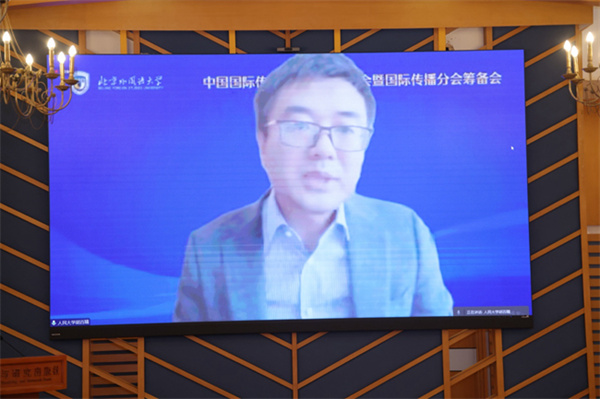
Hu Baijing, deputy secretary of the CPC RUC committee and vice-president of the university, speaks at the meeting. [Photo/bfsu.edu.cn]
Hu Baijing, deputy secretary of the Party committee of Renmin University of China (RUC) and vice-president of the university, talked about system and pattern reconstruction of international communication, that is, taking disciplinary and specialty construction as a breakthrough to re-understanding of such issues as classroom studies, credit, specialties, value cultivation, knowledge training and ability improvement while helping talents in the field to export Chinese ideas, culture, values and wisdom during international exchanges.
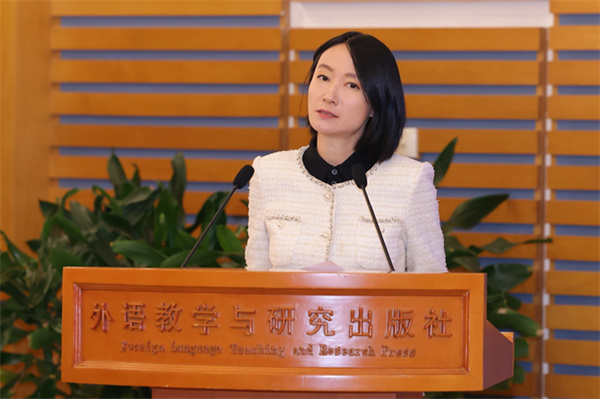
Meng Na, deputy director of the Audio and Video Department of Xinhua News Agency and associate director of the International Communication Platform, shares Xinhua’s experience in international communication. [Photo/bfsu.edu.cn]
Meng Na, deputy director of the Audio and Video Department of Xinhua News Agency and associate director of the International Communication Platform, shared Xinhua’s experience in telling China’s stories through political news and from China's standpoint and perspective, as well as her expectations of outstanding international communication talents.
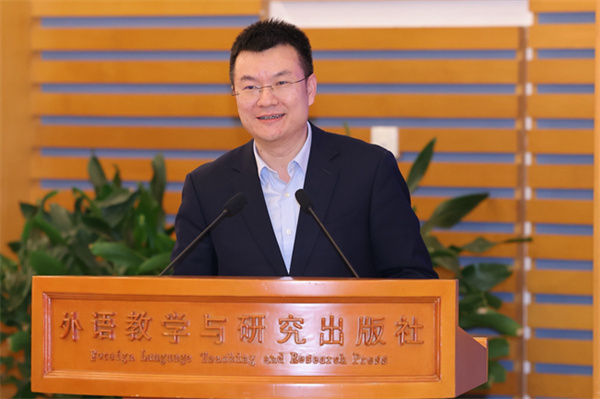
Zeng Qingkai, editor-in-chief of China Daily 21st Century English Education Media, speaks at the meeting. [Photo/bfsu.edu.cn]
Zeng Qingkai, editor-in-chief of China Daily 21st Century English Education Media, said that media institutions have a large scope for cooperation with universities to achieve the integration of foreign languages, journalism and increased discipline construction. In terms of practice platform, the cooperation will be conducive to tackling difficulties in languages, positions, projects and platforms, and will change the pattern of international public opinion by influencing Generation Z (those born in the late 1990s or the early years of this century) to help build a relatively open international communication environment.
At the symposium presided over by Zhao Gang, member of the standing committee of the CPC BFSU committee and vice-president of the university, officials from renowned universities and research institutions exchanged ideas on international communication discipline construction and talent training, and shared the latest research achievements in the field.
The establishment of the CEAIE International Communication Committee responds to the needs of the times, reflects BFSU’s historical responsibility, represents the direction of discipline development, conforms to the expectations of the government, academia and the industry, and serves the national development strategy, attendees said during the free speech session.
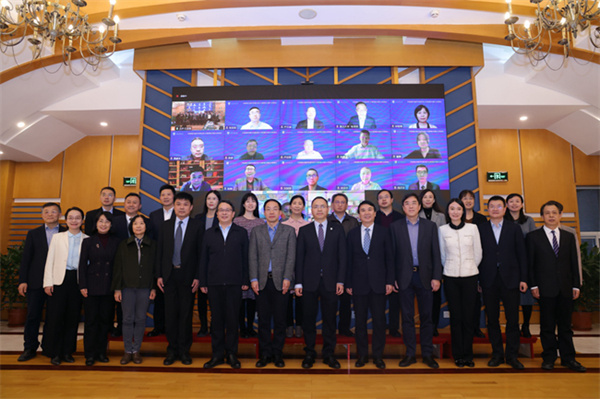
Attendees of the meeting gather for a group photo. [Photo/bfsu.edu.cn]
The International Communication Committee was initiated by BFSU together with domestic universities, media outlets and relevant government departments engaging in international communication education, research and practice under the approval of CEAIE.
The purpose of the committee is to build a platform for Sino-foreign international communication education, research and practice, promote cultural exchanges between China and foreign countries and enhance global understanding. The committee also looks to innovate international communication theories, explore the rules of training such talents, and build a knowledge system with Chinese characteristics.
By forming a cooperation platform between the academic community and industry and organizing experts and scholars in relevant fields to tackle key problems, it aims to promote the integrated development of politics, industry, education and research and build think tanks for China's international communication and soft power construction.